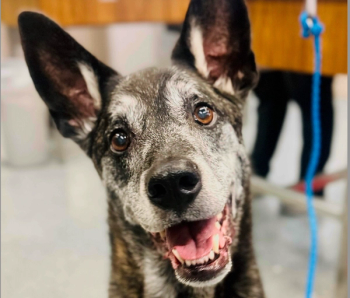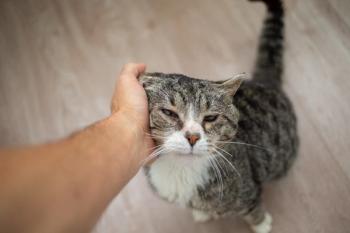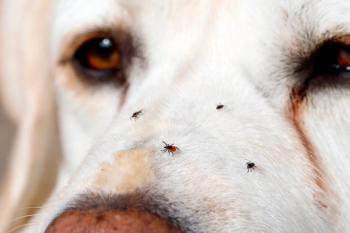
Drained by publicity, 'brilliant' scientist exits
Columbus-A leading veterinary neurologist, equally celebrated and denigrated for his progressive study of feline immunodeficiency virus (FIV), is departing The Ohio State University (OSU). Expected to leave this summer, Dr. Michael Podell - regarded as a "highly brilliant" veterinary clinician and investigator - says his decision to leave is three-fold,
Columbus-A leading veterinary neurologist, equally celebratedand denigrated for his progressive study of feline immunodeficiency virus(FIV), is departing The Ohio State University (OSU).
Expected to leave this summer, Dr. Michael Podell - regarded as a "highlybrilliant" veterinary clinician and investigator - says his decisionto leave is three-fold, hinging on the raucous animal rights protesterslocally and nationally, passive support of academic officials, and a timelyopportunity.
He leaves unfinished his five-year $1.68 million cat project at a timewhen its successes were beginning to surface.
Launched in 2000, researchers experimented with 120 cats and tissue-culturedcat brain cells and infected them with FIV, similar in nature to the humanHIV. The cats are given methamphetamine to determine whether the drug couldstimulate virus replication in their bodies. The ultimate goal is to establishwhether this same process would apply to humans infected with HIV.
Recent findings show that methamphetamine does stimulate virus replicationin cat cells and spreads the virus through the body, a "very successful"find, says Podell, the principal researcher.
In brief
The feline research is based on current epidemiological trends indicatingthat young humans who are hooked on methamphetamines and other illegal drugsare becoming HIV positive globally.
Until now, scientists have not understood the interaction between youngerhumans on stimulants, who are at the highest risk for infection of HIV andother viruses, and the effect of those factors on the ability to becomeinfected and eventually transmit the disease to other people.
"It's a very important epidemiological question and very littleinformation is available," says Podell, who has spent 10 years at OSU."We're the first researchers to be able to identify that this interactionmay be potentially very devastating."
Perhaps just as devastating to Podell was the deluge of perpetual threatsto his research.
Never-ending harassment
The board-certified veterinarian says he was increasingly harassed byanimal rights groups, including People for the Ethical Treatment of Animals(national), Protecting Our Earth's Treasures (regional) and the PhysiciansCommittee for Responsible Medicine.
He insists his decision to leave was not based on harassment alone, butthe perpetrators of what he calls "a standard type of terrorism"unequivocally influenced his final decision.
"They outwardly say they are against harassment or physical violence,but individually I received thousands of harassing e-mails as well as severaldeath threats during the past couple of years," he says.
According to Podell, threats were also made against his family, and actsof vandalism committed against university buildings including the OSU President'shouse.
"Activists don't want to discuss things on a rational basis,"Podell says. "These individuals take a very extremist view of thingsin terms of not wanting to understand the science or benefits to peopleand in that regard it hurts everyone."
Next chapter
As protests mounted, an opportunity for Podell to join a metropolitanspecialty clinical practice was brewing.
"A new chapter" of his life, Podell says the position willallow him to practice neurology "at an even higher level" thanhis current post at the university. He declined to name the practice.
All by himself
Further cementing his decision to leave, Podell says he largely contendedwith the protests without adequate university backing.
"The university is in a situation where they have been unable todemonstrate a consistent and strong response pattern to support me in termsof the animal protest," he says.
OSU President William E. Kirwan, following Podell's resignation notice,wrote a letter to the editor of the Columbus Dispatch praising Podell'sefforts at OSU.
"It's a good feeling to know that people support you, but at thesame time, this is the type of support that was needed from day one. Thereare many outstanding scientists in the country, at Ohio State, and theyneed the full support of all the proper authorities to continue their work,"says Podell.
University responds
Dr. Glen Hoffsis, dean of OSU's College of Veterinary Medicine, regretsthe departure of one of its "very talented" clinicians and researchers,but declined to elaborate on specific protective measures afforded to Podell.
"We've been in discussions with (Podell) for a long time about whatwe could do that would make his position easier and to withstand the bruntof the attacks he was under the last couple of years," says Hoffsis.
"In a general sense, there were many meetings to make sure we hadsecurity for the animals and for the people who worked there, and to discusswhat we were going to try to do to handle demonstrators and communications.
"But it's a free country, so people can demonstrate and do whatthey want to do. It's very difficult unless there is some overt act thatis criminal in nature," says Hoffsis.
Example of support
A faculty member of the University of California, Davis, School of VeterinaryMedicine argues research protection is imperative.
Dr. Niels C. Pedersen, who first isolated the feline immunodeficiencyvirus at UC Davis in 1986, says that supporting investigators and articulatingthe need for animals in research are high priorities at UC Davis.
The university has a vigorous research protocol review policy that canaccurately pinpoint studies that might be vulnerable.
Commenting on Podell's research, Pedersen says, "His research wasof the type that (activists) love to attack. It used a species, e.g., cat,that is associated as a loving pet (even though animal rightists don't believein pets) and not as a research animal (usually mice, rats, guinea pigs ormonkeys)."
Status of FIV research
Since Podell's study was funded by a National Institutes of Health contract,he says he doubts the work will continue without his involvement, but stillwants "to see science advance" in this area.
"For instance if people can understand how viruses increase in theirability to infect and replicate in a body, then that's the first step tounderstanding how it can be stopped," he says.
Hoffsis confirms that OSU is unclear whether the research will proceed.
Nevertheless, Podell is nothing short of pleased with the results thusfar.
"It was good to beon the frontier of those findings. As a clinicalneurologistI've been able to help thousands and thousands of animals aroundthe world, I hope, for their neurologic problems as well as helping animalsand people in basic science to study degenerative disease of the brain withFIV," Podell says.
Newsletter
From exam room tips to practice management insights, get trusted veterinary news delivered straight to your inbox—subscribe to dvm360.






